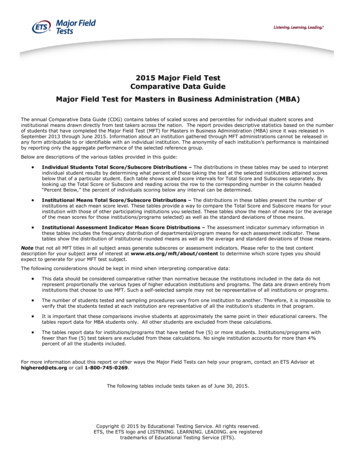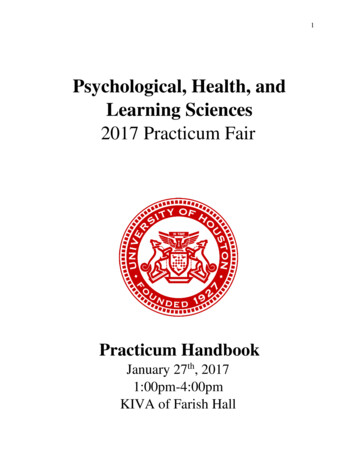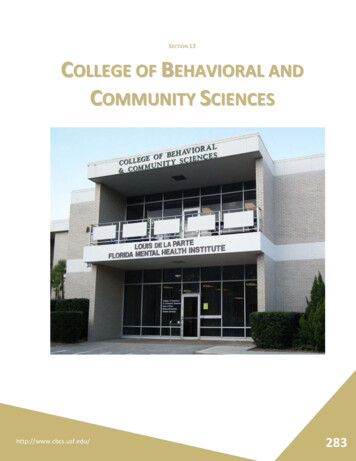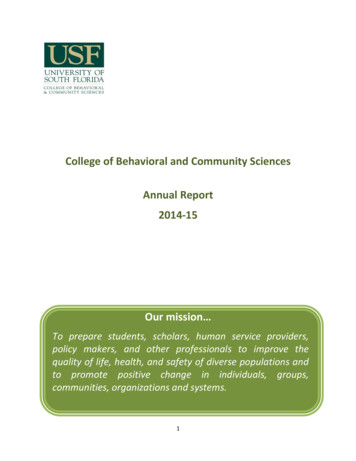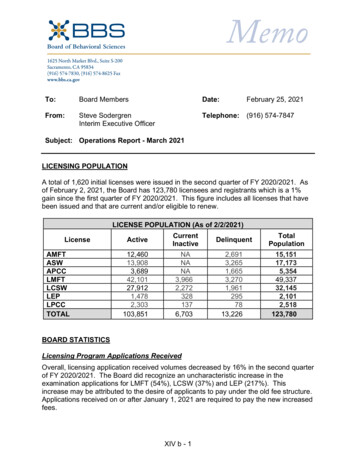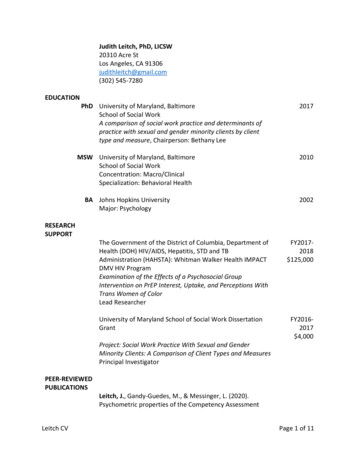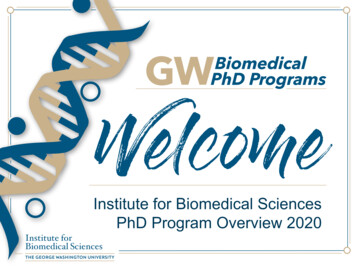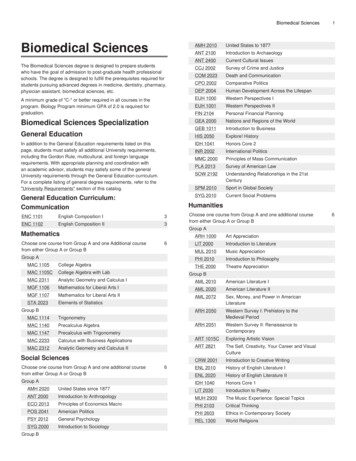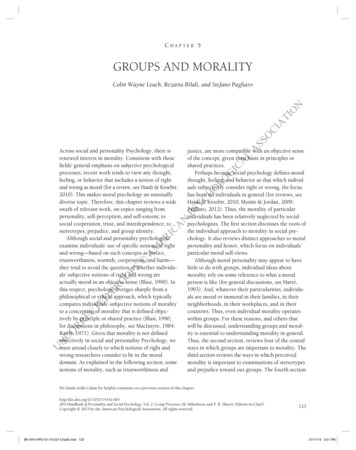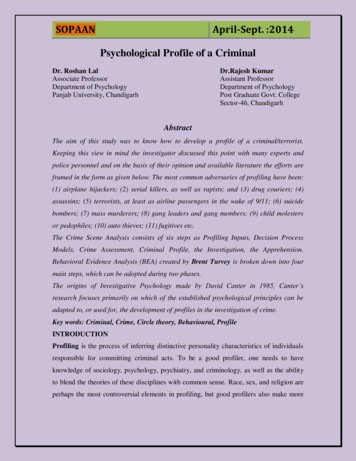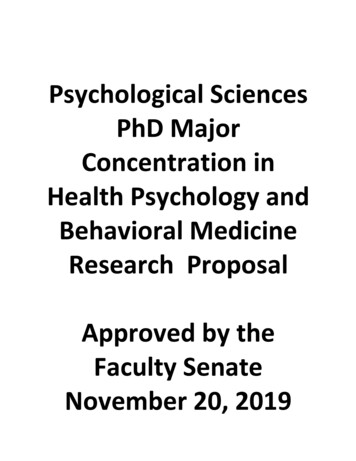
Transcription
Psychological SciencesPhD MajorConcentration inHealth Psychology andBehavioral MedicineResearch ProposalApproved by theFaculty SenateNovember 20, 2019
Doctor of Philosophy (PhD) Degree in the field of Psychology (PhD-PSYC)New Major Concentration: Health Psychology and Behavioral Medicine ResearchDepartment of Psychological SciencesRice UniversityCONCENTRATION Head and ContactChristopher P. Fagundes, Ph.D.Associate Professoroffice / 713-348-2184; cell / 801-835-5026; email / christopher.fagundes@rice.eduFormal Title: Health Psychology and Behavioral Medicine ResearchJustification (& Answers to Questions Outlined) per Graduate Major ConcentrationGuidelines Document section 4 (a)Department of Psychological Sciences proposes a new PhD-PSYC major concentration thataligns with our interests and expertise that we will call the Health Psychology and BehavioralMedicine Research major concentration. For the last five years, we have been building a healthpsychology curriculum at the graduate level. In Academic Year 2018-2019, we added PhDPSYC major concentrations in i.) cognitive and affective neuroscience, ii.) human-computerinteraction and human factors, iii.) industrial-organizational psychology, and iv.) psychometricsand quantitative psychology. We have concluded that we need a formal concentration in HealthPsychology and Behavioral Medicine Research as well. Last year we did not add a healthpsychology major concentration because we thought students who were health-oriented couldchoose to work in other concentrations and take additional courses in health psychology,psychoneuroimmunology, and translational research methods. However, in practice, this wasnot effective. Current health psychology oriented students feel overburdened by fulfillingrequirements outside their interest. The majority of students who are health-oriented realizedthat taking so many classes in either industrial-organizational psychology or cognitiveneuroscience was distracting them from their progress. Furthermore, they were all planning toobtain jobs in Health Psychology and Behavioral Medicine, not neuroscience or industrialorganizational psychology. The health concentration will allow them to have a curriculum basedon their goals and career interest.This new PhD-PSYC major concentration will not require additional funds. No additionalgraduate student fellowships will be needed to start this concentration because (a) the facultywho will participate in this concentration is currently in the department, and (b) the departmentallocates fellowships to individual faculty, not concentrations within the department.Scientists and public health professionals estimate that 70% of all diseases are preventable. Inperfect alignment with this point, health psychology plays an important role in understandinghow behaviors, cognitions, and emotions impact mental and physical health. With thisknowledge, health psychologists design interventions to reduce disease risk, improve treatmentoutcomes, and enhance the quality of life of people coping with illness or seeking to preventPage 1 of 19
illness. Importantly, health psychology plays an important role in primary, secondary, andtertiary prevention. The field of health psychology has clinical and non-clinical health psychologytraining options. In alignment with many top-ranked psychology programs (e.g., UCLA andCarnegie Melon), we will offer the non-clinical health psychology degree option via this majorconcentration, which is a basic science degree.The research PhD-PSYC degree with a major concentration in Health Psychology andBehavioral Medicine Research will further facilitate the relationship Rice has with the TexasMedical Center. Faculty in this area of research currently have National Institute of Health (NIH)sub-contracts with faculty in the medical center, and multiple medical center faculty guestlecture in our graduate-level health psychology classes; medical center faculty also helpsupervise our Ph.D. students; thus, the health psychology major concentration leverages theintellectual capital Rice benefits from by being adjacent to the largest medical center in theworld. This training model has already resulted in seven individual training grants (primarily fromthe National Institute of Health (NIH) awarded to our trainees and primarily supervised by ourhealth-focused psychology faculty. In comparison to other psychology departments with healthpsychology Ph.D. programs, we will have a strategic advantage because of our proximity to (a)the largest medical center in the world, (b) largest and highest-ranked cancer center in theworld, (c) the world’s largest children’s hospital, and (d) the Center for Clinical and TranslationalResearch Center, which our health faculty utilize. Accordingly, the health psychology Ricefaculty are well-positioned to obtain large health grants; increasing external grant funding is alsoa high priority at Rice over the next decade. The NIH is the primary funder of most of this workand offers funding for research, training, and educational opportunities. The Health Psychologyand Behavioral Medicine Research major concentration will align with other V2C2 goals, suchas its focus on health and health disparities.We want to recruit our first class in the fall of 2020. Currently, two of our students want to be inthis major concentration; they are still junior enough in their graduate careers to graduate ontime if this new major concentration is approved soon. They have already taken many of therequired classes.What is the target audience for the Major Concentration?The target audience is Psychology Ph.D. students working within the Health Psychology andBehavioral Medicine Research major concentration within the department. Drs. Fagundes andDenny will be the core faculty members. Other faculty who have students interested in healthpsychology include Drs. Mikki Hebl (social/health), Fred Oswald (personality/health), StephanieLeal (neuroscience/health), Randi Martin (neuroscience/health), Margaret Beier (Aging andHealth), Pat DeLucia (Medical Human Factors), and Eden King (health psychology in theworkplace). Students who have lines of research that apply to primary, tertiary, or secondarydisease prevention will benefit. Dr. Fagundes will oversee this concentration; as evidenced byhis publication, award, and grant record in health psychology, he is qualified to do so.Page 2 of 19
What is the need or demand for the Major Concentration?Health psychology and Behavioral Medicine Research is a common interest among nine facultywithin the Psychological Sciences department. Currently, there is a health psychology weeklyseminar. With this major concentration, students will have credentials for obtaining healthpsychology jobs, and the Department of Psychological Sciences will be able to recruit graduatestudents into health psychology more easily. As is evident from our department’s track recordsecuring health psychology research and training grants (primarily via NIH), our department isbecoming known for excellence in this major concentration. Trainees who work in this domainhave already obtained competitive tenure-track positions at elite universities (e.g., Penn StateUniversity) under the mentorship of faculty in the Department of Psychological Sciences at Rice.Thus, a research interest group is a natural next step.How do the Major Concentration requirements and curriculum differ from the othergraduate degrees offered by the academic unit?Requirements for the major concentration in Health Psychology and Behavioral MedicineResearch includes courses in psychoneuroimmunology, foundations of health psychology, andtranslational research methods. These courses include topics not covered in other majorconcentrations, including psychoneuroimmunology, health behavior interventions, clinical trialdesign, autonomic psychophysiology, and basic pathophysiology of stress-related diseases.Students also obtain a strong foundation in social and personality psychology. Theserequirements are different from those of other core research concentrations in the department.Importantly, this is a research degree, not a clinical degree. These requirements do not includecourses in psychotherapy, clinical assessment, or consultation.Is there any potential for the Major Concentration to attract students to the detriment ofexisting graduate degrees?No.How will it complement their graduate degree?This new major concentration, as with the other four existing PhD-PSYC major concentrations,provides official recognition of existing specializations and research areas within the graduateprogram in the Department of Psychological Sciences.How is the Major Concentration distinct or related to previously approved majorconcentrations?A major concentration in Health Psychology and Behavioral Medicine Research is distinct fromour other programs because it teaches students to utilize a biopsychosocial approach tounderstand mental and physical health risks and develop evidence-based interventions. It willalso be unique in that it teaches translational research methods (an approach wherePage 3 of 19
researchers start from basic science research, then create interventions, and ultimatelydisseminate research in the community). The Translational Research Methods course that willbe offered would alleviate concerns about overburdening PSYCH 507 (research methods)instructors. Yet it will be novel enough that students could take both as the current psychologycurriculum does not offer training in clinical trials.Is a student required to complete a Major Concentration to complete the graduate degreeprogram, or is the completion of a Major Concentration optional?Psychology Ph.D. students must complete a Major Concentration to complete the graduatedegree program.Justification (& Answers to Questions Outlined) per Graduate Major ConcentrationGuidelines Document section 4 (b)Provide a description of the requirements for the Major Concentration. Please list anyrequired courses, electives, other requirements to complete the Major Concentration.Please see the end of this section for a list of Major Concentration requirements.The courses that are required for the Ph.D. will be offered on a schedule that will easily allowstudents to obtain their Ph.D. on time. Health psychology will be offered every year because it isa “Foundations Course” and thus fulfills other a core requirement for other concentrations.Translational research methods and psychoneuroimmunology will be offered every other year.The Health Research Seminar is offered every semester. Advanced Psychological Statistics I isoffered every fall, and Advanced Psychological statistics II is offered every spring. Social andAffective Neuroscience is offered every other year. Foundations of Social Psychology andFoundations of Cognitive Psychology are offered at least every other year. At least oneadvanced statistical course (e.g., multivariate, psychometrics) is offered annually. Dr. Fagundeswill start offering History and Systems every other year. In sum, every course unique to the“health concentration” will be offered at least every other year. Furthermore, all otherrequirements are currently offered at least every other year because they fulfill requirements forexisting concentrations. All other requirements are offered regularly to satisfy Ph.D.requirements in the other existing major concentrations.In sum, all requirements proposed for the satisfaction of the major concentration are alreadyoffered to Ph.D. students in the department of psychological sciences regularly, except fortranslational research methods. Dr. Fagundes is currently developing this course and goingthrough the approval process. Because students in the health psychology concentration havethe option of taking research methods in industrial-organizational psychology to fulfill thisrequirement, all courses to obtain a Ph.D. in the proposed Health Psychology and BehavioralMedicine Research concentration are currently offered.Page 4 of 19
Per Graduate Major Concentration Guidelines Document section 4 (c), Multipleconcentrations. Will students in the graduate program be permitted to declare andpursue more than one Major Concentration?Yes.If so, please provide a justification. Please describe how the additional MajorConcentration is identified and earned. How will it provide benefits to a student?Multiple existing major concentrations at Rice have sub-fields with a health emphasis. Within thefield of cognitive-affective neuroscience, a new field called “health neuroscience” is emerging.Students will be able to obtain multiple major concentrations, making them highly competitive forthese jobs. In the field of industrial-organizational psychology, there is a sub-concentrationcalled occupational health psychology (OHP). Multiple major concentrations in industrialorganizational psychology and health psychology would make students highly competitive forthese jobs. Within the field of human factors, there is a field called medical human factors.Human factors students may benefit from both major concentrations. To complete and receiverecognition for multiple major concentrations, students must fulfill both major concentrationrequirements. If students plan appropriately, they will be able to graduate with a PhD-PSYC andmultiple major concentrations in 5 years. Graduates will be well qualified for tenure track jobsand post-docs in psychology departments, medical centers, cancer centers, and colleges ofpublic health. They will also be eligible for jobs at the CDC, NIH, and in some medical schoolsand comprehensive cancer centers.Is there a potential for it to be detrimental to a student?No.Could the set of requirements for one Major Concentration automatically fulfill therequirement for other Major Concentrations within the graduate program?No.Ph.D. Program: Update and Change to Program Justification (& Answers to QuestionsOutlined) per Graduate Major Concentration Guidelines Document section 4 (d)Provide a list of participating faculty. Identify faculty who will have primary roles inadministering the Major Concentration and advising student participants.The target audience is Psychology Ph.D. students working within the field of Health Psychologyand Behavioral Medicine at Rice. They do not have their major concentration as of now. Drs.Fagundes and Denny will be the core faculty members in health psychology. Other faculty whohave students interested in health psychology include Drs. Mikki Hebl (social/health), FredPage 5 of 19
Oswald (personality/health), Stephanie Leal (neuroscience/health), Randi Martin(neuroscience/health), Margaret Beier (Aging and Health), Pat DeLucia (Medical HumanFactors), and Eden King (health psychology in the workplace). Students who have lines ofresearch that apply to primary, tertiary, or secondary disease prevention will benefit.The primary responsibility for administering the Major Concentration and advising studentparticipants will be Dr. Christopher Fagundes.Page 6 of 19
Per Graduate Major Concentration Guidelines Document section 4 (e)Procedures and qualifications for approval to pursue the Major Concentration (i.e.,document the departmental/program procedures that will be put in place to certifyeligibility and completion of the Major Concentration requirements, etc.)Ph.D. students admitted to the Doctoral Program in Psychology in the School of SocialSciences, whose graduate advisor is affiliated with the Health Psychology and BehavioralMedicine Research concentration will be eligible. The offices of the Director of Graduate Studiesin the Department of Psychological Sciences and the Director of the health psychology andbehavioral medicine major concentration will be responsible for certifying eligibility and formonitoring progress in the program and completion of the major concentration requirements.Per Graduate Major Concentration Guidelines Document section 4 (f)List the procedures and qualifications to comply with SACSCOC accreditationrequirements, as well as best practices in curriculum design; the proposal must include:(1) Description of the Major Concentration’s student learning outcomes that are clearstandards for observable, measurable student-centered outcomes in terms ofknowledge, skills, and behaviors;Students completing the Major Concentration will:1.Apply the theoretical tools and basic biobehavioral research methods to carry outindependent research in health psychology.2.Apply the methodological and statistical tools necessary to carry out independentresearch in health psychology.3.Conduct a focused literature review tied to an independent research question, designand run a health research study, and write up the results in an APA formatted paper.4.Communicate and defend their research designs and modeling choices when presentingpapers and presentations.5.Write an independent and original dissertation that is of sufficient quality to meritpublication in a top journal within the field of health psychology.(2) A curriculum map that relates the components of the proposed Major Concentrationcurriculum to the specified student learning outcomes rkXXXXXFor the first three columns above—core courses, substantive courses, and statistical courses—please see the end of this section.Page 7 of 19
(3) An assessment plan for measuring the success and effectiveness of the MajorConcentration curriculum and students’ achieving the learning outcomes afterimplementation.Progress and performance are assessed through a variety of feedback and evaluationmechanisms: continuous meetings and feedback from advisors and other faculty, monitoringcourse grades during and after each semester, conducting semester performance reviews in thedepartment, and conducting an annual review within the health major concentration.Students are evaluated on their coursework, their independent research projects and researchcollaborations, their first-year and second-year projects, and their master’s thesis and doctoralthesis work. Each semester, students take a Health Psychology Research Seminar (PSYC532), where they are required to present their master’s thesis and conference-based research.Per Graduate Major Concentration Guidelines Document section 4 (g)Supporting letters from the chair(s) of participating departments/programs and theappropriate dean(s) verifying that:a. The proposed Major Concentration has been reviewed and received faculty approvalthrough appropriate governance procedures;The proposed PhD-PSYC major concentration has been approved by the graduate committee inthe Department of Psychological Sciences (Drs. Fred Oswald, Randi Martin, Mikki Hebl, andChristopher Fagundes). Dr. Eduardo Salas, Chair of the Department of Psychological Sciences,also approves and has been included in these critical discussions and meetings.b. Resources to support the Major Concentration, as presented in the proposal, areavailable without impacting other courses and programs for at least five years.See answers to related questions. This proposal has been approved by the department Chairand department Director of Graduate Studies, and it is awaiting review and approval by all otherinvolved parties (e.g., Graduate Council, OIE).Per Graduate Major Concentration Guidelines Document section 4 (h)The complete and specific language describing the official name of the MajorConcentration and the exact requirements for students to complete it – as they wouldappear in the General Announcements if the proposal were approved. The MajorConcentration must be in place and the General Announcements for the year in whichthe student matriculates, or graduates, or any year in between.Upon approval, the Office of the Registrar will work with the Department of PsychologicalSciences on updating the General Announcements text.Per Graduate Major
psychoneuroimmunology, and translational research methods. However, in practice, this was . graduate student fellowships will be needed to start this concentration because (a) the faculty . In alignment with many top-ra
